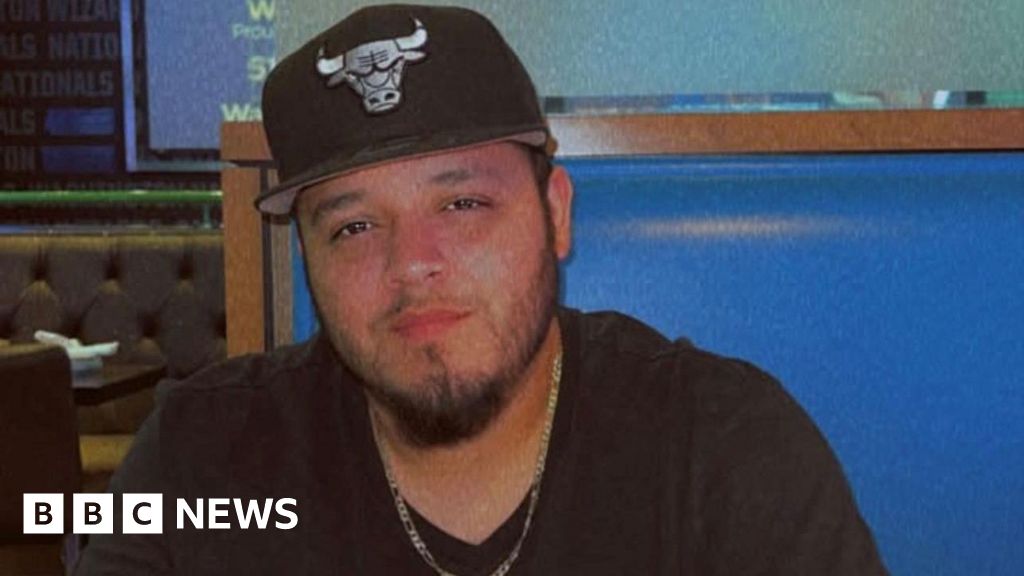The US Supreme Court has ruled unanimously that the Trump administration must try to release a Maryland man who was mistakenly deported to a mega-jail in El Salvador.
In a 9-0 ruling, the justices declined to block a lower court’s order to “facilitate” bringing back Kilmar Abrego Garcia, but they also said a judge in the case may have exceeded her authority.
The Trump administration had appealed against the district court’s order, but now government lawyers must explain to the judge what steps they are taking to free Mr Garcia.
The government has conceded he was deported due to an “administrative error”, though it also alleges he is a member of the MS-13 gang, which his lawyer denies.
Mr Garcia, a Salvadoran, is one of dozens of alleged gang member migrants placed by the US on military planes last month and flown to El Salvador’s notorious Cecot (Terrorism Confinement Centre) under an arrangement between the two countries.
Following the Supreme Court’s order, lawyers for the Trump administration went in front of Judge Paula Xinis of the Maryland district court on Friday to explain how they will release Mr Garcia.
The judge had asked the government to explain by that morning how they planned to bring Mr Garcia back, but justice department attorneys filed a motion asking for the deadline to be extended until Tuesday evening.
A Maryland court clerk, however, found that the attorneys who filed that motion were not even registered to practise law in the state of Maryland, according to the BBC’s US partner CBS.
During an at-times tense hearing that lasted about half an hour, Judge Xinis repeatedly pressed the government for specifics on Mr Garcia’s whereabouts.
At one point she said: “Is anyone moving with any kind of speed to get to the bottom of this so I can get an answer?”
Judge Xinis ultimately ruled that the government must provide her with daily updates on Mr Garcia’s location and status, what efforts it had previously taken to get him back to the US and what efforts it will undertake.
“We are going to make a record of everything the government is doing and not doing,” she reportedly said during the hearing.
Government lawyer Drew Ensign said the court’s deadlines were “impractical”.
In court documents, Mr Garcia’s lawyers accused the government of trying to “delay, obfuscate and flout court orders, while a man’s life and safety is at risk”.
In its emergency appeal to the Supreme Court last week, the Trump administration argued that Judge Xinis lacked the authority to issue the order to return Mr Garcia by Monday night, and that US officials could not compel El Salvador to return him.
US Solicitor General Dean John Sauer wrote in his emergency court filing: “The Constitution charges the president, not federal district courts, with the conduct of foreign diplomacy and protecting the nation against foreign terrorists, including by effectuating their removal.”
The Supreme Court, which has a 6-3 conservative majority, issued its decision in an unsigned order on Thursday.
The justices did not give the administration a deadline for when Mr Garcia should be returned.
They said Judge Xinis may have exceeded her authority when she required the Trump administration to “effectuate” Mr Garcia’s return.
“The district court should clarify its directive, with due regard for the deference owed to the executive branch in the conduct of foreign affairs,” the Supreme Court order said.
A justice department spokesperson told the BBC that the Supreme Court correctly recognised “it is the exclusive prerogative of the president to conduct foreign affairs”.
“By directly noting the deference owed to the executive branch, this ruling once again illustrates that activist judges do not have the jurisdiction to seize control of the president’s authority to conduct foreign policy.”
Mr Garcia, 29, entered the US illegally as a teenager from El Salvador. In 2019, he was arrested with three other men in Maryland and detained by federal immigration authorities.
But an immigration judge granted him protection from deportation on the grounds that he might be at risk of persecution from local gangs in his home country.
His US citizen wife, Jennifer Vasquez Sura, has been calling for his release since his deportation.
“I will continue fighting until my husband is home,” she told the New York Times on Thursday.
















Leave a Reply